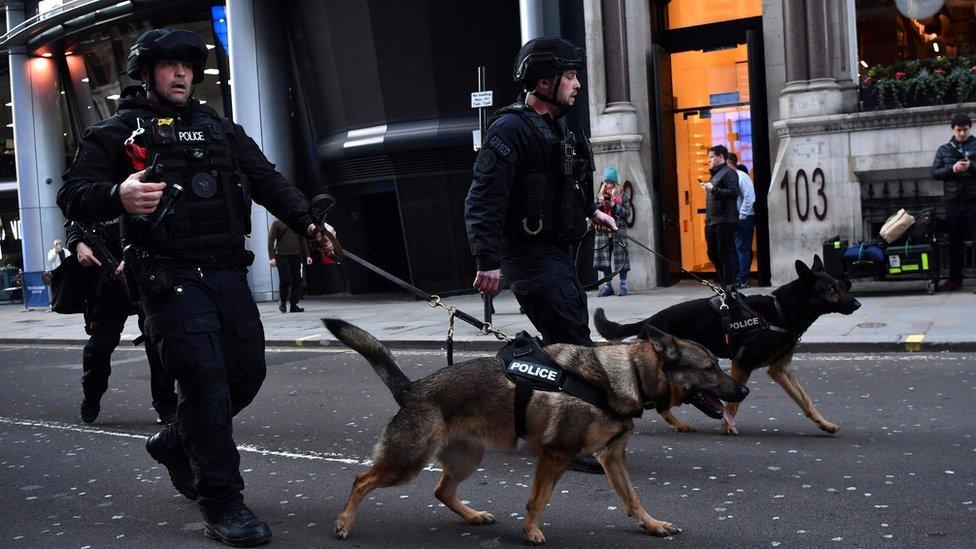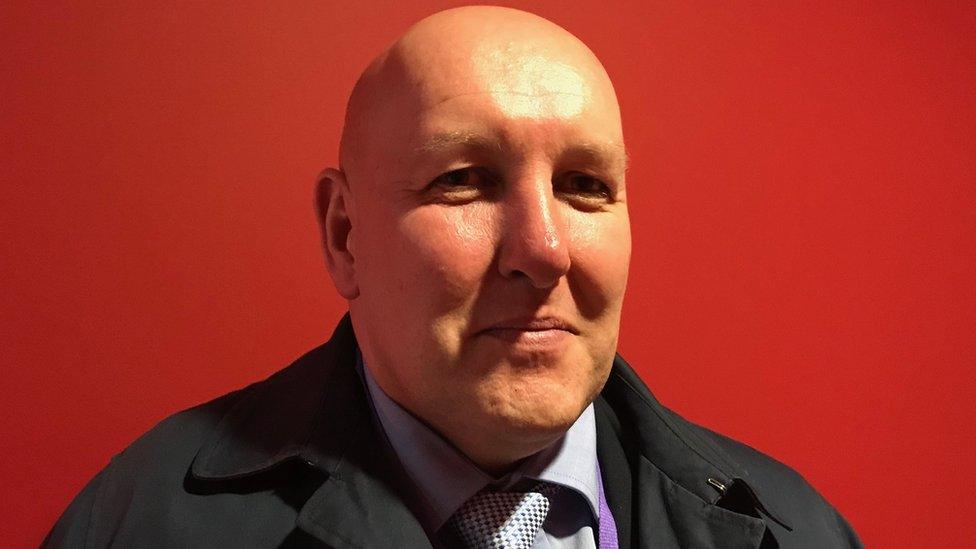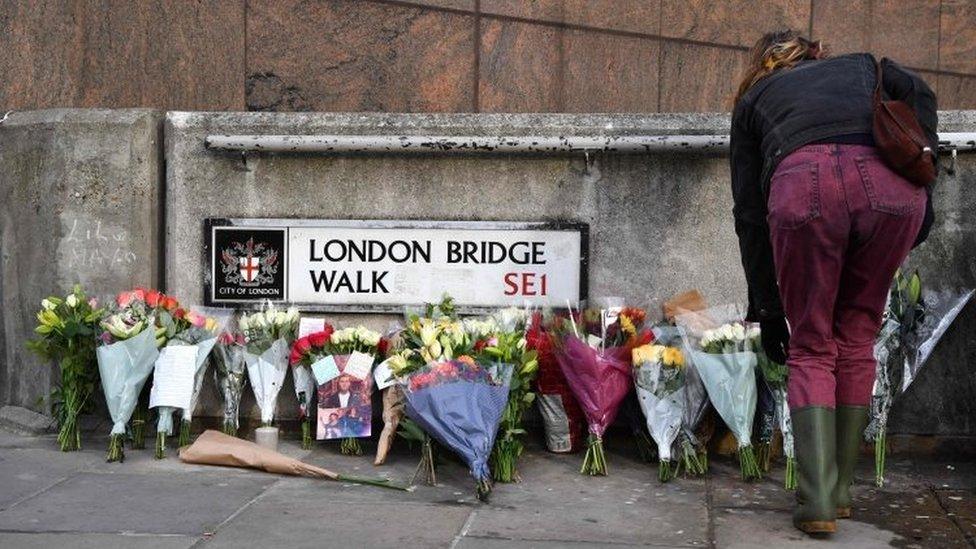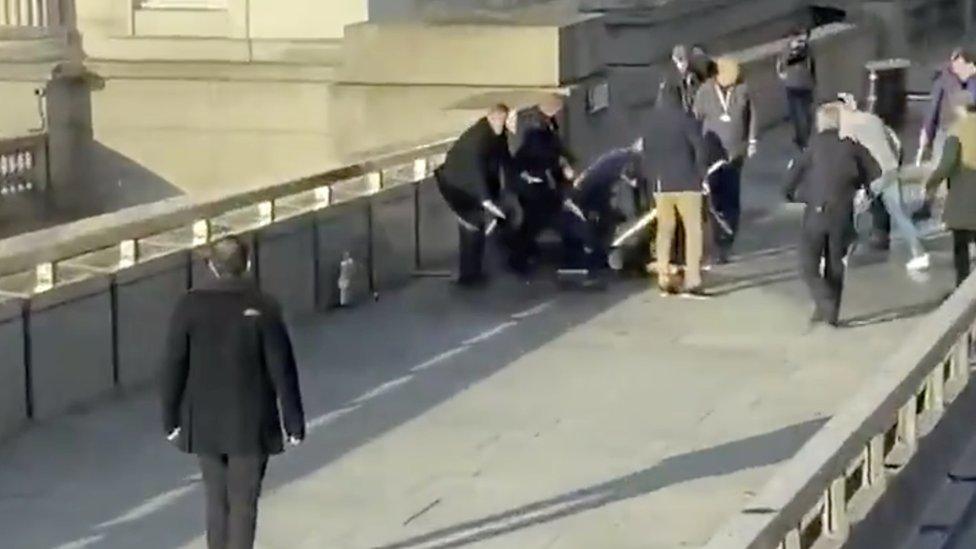De-radicalisation approach needs 'fundamental review' - Prison Officers' Association
- Published

Jack Merritt was killed in the London Bridge attack last year
The Prison Officers' Association has called for a "fundamental review" of the UK's de-radicalisation programmes.
Dave Merritt, father of London Bridge attack victim Jack Merritt, told BBC Radio 4's File on 4 that "something was going wrong" with the current system.
His son's attacker, the convicted terrorist Usman Khan, previously took part in two Home Office de-radicalisation programmes.
The government said it had "tough measures" to tackle prison extremism.
But Sudesh Amman, who injured passers-by in a knife attack in Streatham in February is reported to have refused to engage, external with attempts to turn him away from violence.
And Mark Fairhurst, national chair of the POA, said those who did take part in government schemes may be going "through the motions" to "make us think that they've conformed and rehabilitated themselves and de-radicalised".
The government said that, between January 2013 and December 2019, only 3% of offenders convicted under terrorism laws went on to commit a further terror offence.
The latest government figures show that there are 224 prisoners in British jails who have been convicted of terrorist offences, around three quarters of whom are associated with Islamist extremism.
Around 60 terror offenders are currently being managed by probation services in England and Wales.

Armed police at the scene of the London Bridge attack
Many prisoners will be offered Health Identity Intervention (HII), a programme developed with psychologists and prison staff, and introduced into prisons over the last decade.
This is supplemented by the Desistance and Disengagement Programme (DDP), which can be offered to both prisoners and those released on licence.
According to the Home Office, it is "part psychological, part ideological, part theological".
These schemes have been criticised because London Bridge attacker Khan participated in both HII and DDP, yet went on to launch the attack at London Bridge less than a year after his release from prison for plotting terrorist attacks.
Neither the HII nor the DDP courses have undergone any formal evaluation process. A short-term outcome evaluation of the HII is underway and will end next year.
'Clearly not working'
Mr Merritt said the Streatham and London Bridge attacks indicated that "something was going wrong".
He added: "Something is clearly not working if people are being let out and going on very soon afterwards to commit serious offences.
"One thing we are keen to point out is that longer sentences in themselves are not a solution to anything because those prisoners will be released eventually.
"I think the important thing is that steps are taken to address their offending while they're in prison."

Mark Fairhurst of the Prison Officers' Association
Mr Fairhurst added: "The question has to be asked, are we dealing now with a different dynamic?
"Are we dealing with people who are effectively sleeper cells who go through the motions, who make us think that they've conformed and rehabilitated themselves and de-radicalised?
"I would say it's very easy to fake anything in a prison. We need stricter guidelines. let's not play games with people's lives."
He called for a "fundamental review" of these rehabilitation schemes.
Since the Streatham attack, the government has introduced emergency legislation that will ensure offenders convicted of terrorist offences will now have to serve at least two thirds of their sentence, before being eligible for a Parole Board assessment.
Independent Reviewer of Terrorism Legislation Jonathan Hall QC told File on 4 he was concerned by additional, proposed legislation forcing "the most dangerous extremist prisoners" to serve the full length of their sentence without any possibility of parole.
He said: "Someone will go into prison having committed a very serious offence and say to themselves, 'I've got no reason to admit my offending to address the risk factors', and come out after 12 years, perhaps as dangerous as when they went in.
"I'm hoping that the government will think again about those possible consequences."
The government said: "Robust supervision or monitoring arrangements will be in place for all offenders upon release.
"We have tough and world-leading measures in place to prevent extremist prisoners from spreading their poisonous ideology and do not hesitate to take action when needed.
"This work is led by a nationwide network of counter-terrorism specialists embedded throughout the prison and probation service, while 29,000 staff have received enhanced training to spot the signs of extremism."
File on 4's Extreme Measures: Can Extremists be De-radicalised? is on BBC Radio 4 on Tuesday 10 March at 20:00 and available afterwards on BBC Sounds.
- Published4 December 2019

- Published21 February 2019

- Published30 November 2019

- Published30 November 2019
